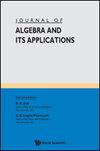关于分级模类中的若干分级对象
IF 0.6
3区 数学
Q3 MATHEMATICS
引用次数: 0
摘要
设[公式:见文]是一个[公式:见文]-分级环,设[公式:见文]是[公式:见文]-分级[公式:见文]-模和齐次同态的范畴。本文对这一范畴的一些对象进行了界定和研究。更确切地说,我们介绍了分级双(弱和强分级双)模块的概念,并给出了这些类型模块的一些来源和示例。可见,在一定条件下,分级二重性质是这个范畴的局部性质。当环[公式:见文]是具有唯一的[公式:见文]极大理想[公式:见文]的离散分级估值环时,我们看到这三种类型的分级(对偶)模是相同的,并给出了它们的明确刻画,使得在这样一个环上的任何分级(对偶)模对于某些正整数[公式:见文]和某些整数[公式:见文]都具有[公式:见文]或[公式:见文]的形式。当[公式:见文本]是一个分级的Dedekind域时,执行同样的任务。最后,通过一个提供了多种强梯度双模的例子,证明了如果地环不是Dedekind,所给出的描述是不成立的。本文章由计算机程序翻译,如有差异,请以英文原文为准。
On some graded objects in graded module category
Let [Formula: see text] be a [Formula: see text]-graded ring and let [Formula: see text] be the category of [Formula: see text]-graded [Formula: see text]-modules and homogeneous homomorphisms. In this paper, we define and study some objects in this category. More precisely, we introduce the concepts of graded duo (weak and strong graded duo) modules and give some sources and an example for these types of modules. It is seen that, under some condition, graded duo property is a local property in this category. When the ring [Formula: see text] is a discrete graded valuation ring with unique [Formula: see text]maximal ideal [Formula: see text], we see that these three types of graded (duo) modules are identical and give an explicit characterization of them, so that any graded duo modules over such a ring is of the form [Formula: see text] or [Formula: see text] for some positive integer [Formula: see text] and some integers [Formula: see text]. The same task is done whenever [Formula: see text] is a graded Dedekind domain. Finally, by an example, that provides a wide variety of strong graded duo modules, it was shown that the given characterizations do not hold valid if the ground ring is not Dedekind.
求助全文
通过发布文献求助,成功后即可免费获取论文全文。
去求助
来源期刊
CiteScore
1.50
自引率
12.50%
发文量
226
审稿时长
4-8 weeks
期刊介绍:
The Journal of Algebra and Its Applications will publish papers both on theoretical and on applied aspects of Algebra. There is special interest in papers that point out innovative links between areas of Algebra and fields of application. As the field of Algebra continues to experience tremendous growth and diversification, we intend to provide the mathematical community with a central source for information on both the theoretical and the applied aspects of the discipline. While the journal will be primarily devoted to the publication of original research, extraordinary expository articles that encourage communication between algebraists and experts on areas of application as well as those presenting the state of the art on a given algebraic sub-discipline will be considered.

 求助内容:
求助内容: 应助结果提醒方式:
应助结果提醒方式:


